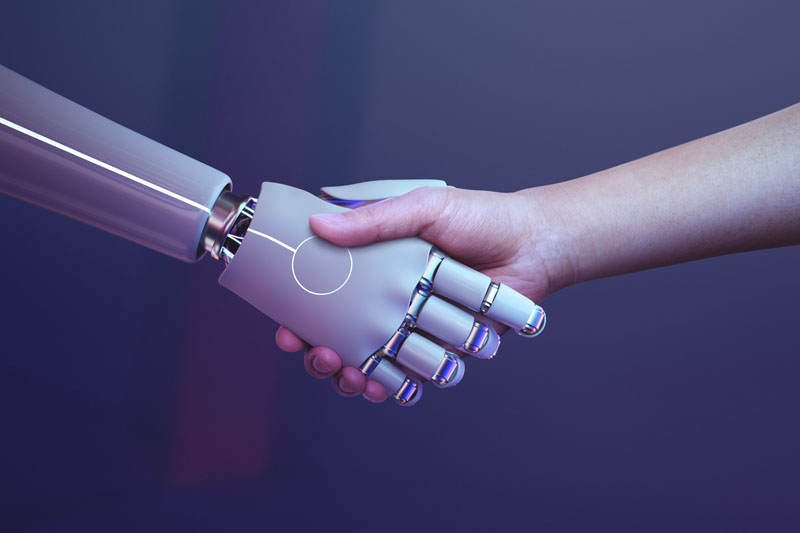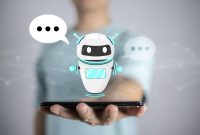When employers look at the fast growth of AI technology in the job market today, they probably think of robotic processes that make work easier, faster, and better. On either hand, employees probably worry that a machine will take their jobs.
AI is meant to replace manual labor with a better and faster way to work, but it can’t do everything independently. People are still needed in the workplace. In this article, you’ll learn why humans still have a lot to offer in the workplace and why AI can’t take over completely.
AI Lacks Emotional Intelligence
Emotional intelligence is one thing that sets people apart and keeps them useful in the workplace. You can’t say enough about how important emotional intelligence is at work, especially with clients. As social animals, humans have an unavoidable basic need to feel emotionally connected to other people.
This connection is made possible by how the hormones and emotions of the people involved interacting with each other on a chemical and biological level. AI doesn’t have it because it comprises software and chips, not living cells. Good company owners and company leaders know how important it is to appeal to the feelings of their employees and clients.
A machine can’t connect with people on this level, but you can improve your emotional intelligence as a person. No matter how well AI machines are programmed to respond to people, people are unlikely to feel so emotionally connected to them. So, AI can’t replace people, especially since business growth depends on connecting with others.
AI Can Only Operate With Input
AI can only operate with the information it gets. Anything more than that would be too much for the machine to handle, and that’s not how machines are made. So, the machine is useless if the information put into it doesn’t include a new area of work or if its algorithm doesn’t include unplanned events.
These problems often happen in the tech and manufacturing industries, and AI builders always try to find short-term solutions. One common myth about artificial intelligence is that AI tools will adapt to any situation.
So, if you’re worried that AI will spread to every industry and eliminate the need for your skills, you can rest easy knowing that won’t happen. AI can’t easily copy human reasoning or how the human brain can analyze, create, improvise, move, and gather information.
AI’s ability to be creative is limited by the data it receives.
AI isn’t as good as humans at coming up with new ideas and ways to work because, as we’ve already said, it can only work with the data it gets. So, it can’t come up with new ways, styles, or patterns of doing work and has to stick to the templates.
Both employers and employees recognize how crucial creativity is in the workplace. AI is designed to do boring, repetitive tasks, but creativity gives us the pleasant feeling of doing something new and different. Creativity is essential to coming up with new ideas. Being able to think outside the box is related to thinking creatively.
Think inside the box is how machines are made. This means that AI tools can only work based on their given data. They can get information from different places and come up with solutions to hard problems even when they have little or no data to work with. AI can’t replace humans in the workplace because it can’t think outside the box or develop creative ideas for innovation.
AI Lacks Soft Skills
Every worker in the workplace needs to have soft skills. Some of them are working as a team, paying attention to details, thinking critically and creatively, communicating well, and getting along with others. These soft skills are needed in every field, and you need to work on them if you want to do well in your career.
People are taught and expected to have these skills, and developing them is good for everyone, no matter their position. Executives of a company and field workers in any industry need them to do well. So, these soft skills give you an advantage over AI in the workplace.
On the other hand, soft skills are not something that machines with AI can do. AI can’t teach these soft skills, which are important for growth and development in the workplace. It would be best if you were smarter and had more emotional intelligence to learn these skills.
Humans Make AI Function
Without the intelligence of people, there would be no artificial intelligence. Artificial intelligence means that people made it. AI is made with lines of code that people write. Humans put the information that AI machines use into them. And people are the ones who work with these machines.
As the number of ways AI can be used grows, so will the need for human services. Someone has to design the AI processes of the machine, build it, run it, and take care of it. People can only do this. Based on these facts, you can confidently throw out any ideas that AI will replace people in the workplace.
AI is meant to add to and not replace human skill and intelligence.
AI applications are becoming more popular in the workplace and will soon take over many jobs that people do now. But the jobs it can do are limited to things that are done repeatedly and require less thinking. Changing workplace needs will also give people new jobs as the world moves toward a more integrated tech landscape.
A record from the World Economic Forum has shown that while AI-powered machines will take about 85 million jobs in 2025, AI will also create about 97 million new jobs in the same year. So, the big question is: How can people work with AI rather than being replaced by it? Our attention should be on that.
Because in this day and age, it will be hard or even impossible to live without AI, and there would be no AI without humans. Organizations looking to the future are already working on combining human skills and AI to increase productivity and creativity.





